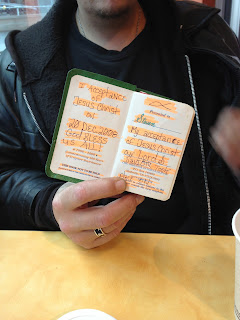Last night, totally spontaneously, I made a red-wine reduction sauce. Seriously. (Those who know me don't believe this could possibly be true, but I'm telling you, it is.) As I was making it, I was wondering what exactly was happening and why exactly it is called "reduction." The recipe I was using said to reduce the liquid by half before putting in several other ingredients. So, is it just reducing the amount, and if that's the case, why not just use less to begin with? No, that's not all that's happening, just like a bulb of garlic is VERY different than a clove of garlic.
In cooking, reduction means thickening or intensifying the flavor of a liquid by boiling. Through this process, flavors already in the liquid are concentrated. This is why various cooking websites counsel you to use a "good" wine for this process. If the wine doesn't have any good flavors to begin with, there is nothing good to intensify or concentrate. So reduction actually increases the flavor. This cooking lesson came at a good time for me. I had spent all day packing up stuff and giving or throwing it away. Reducing.
Why? Beginning a couple weeks after I got back from Africa, I started feeling a dull ache of anger. It arises at strange times, always unexpectedly. I don't always recognize it as anger, and I hadn't been able to put my finger on its cause. On Friday, on the train ride home, I finally got it -- I recognized the anger when it came and I knew exactly what caused it.
A young guy came aboard midway through the ride and by then, all of us who had gotten on downtown had gotten comfortable, spread out our things, stuck our earphones in, and tuned out the world. This guy approached a man in a suit who was sitting in one seat and whose stuff was sitting in the other. The young guy asked if he could sit where the man's stuff was. Without looking the guy in the eye, the man said "No," stared out the window, and took a swig out of a giant Budweiser can. You would think I'd just witnessed a serious criminal act. Rage bubbled up from inside of me and I looked around to see if anyone else noticed. I was incensed. How did this man (and it's not just him) become this way? How did this become okay to say, to do? No one said anything. No one else moved. Because of where I was sitting, there was nothing for me to do, although I do wonder if I would have acted if in a position to do so. But, how is it that we believe our stuff deserves a seat on a train, even when another person wants it, has no other seat to sit in, and asks politely? At that moment, all the anger I'd been feeling came together.
I have been angry because of our excess. My excess. Your excess. Excessive on the inside. Excessive on the outside. It's not just the excess, but the failure to recognize the excess. To come to believe that excess is the normal, or worse, not enough. Our excess is exemplified in two things: excess stuff and excess self. And the excess stuff just feeds the excess self. So much so that we have entire places, houses for our stuff (called storage facilities). I recently pointed out to my daughter how ridiculous it is that we have little homes for our extra stuff. Before I finished the thought she added: "Especially when there are people who don't have homes." Good point, and this is where the excess self comes in. What if I took what I spend to store my stuff and instead put it towards a home for a homeless person. I'm not kidding. I pay $139 per month to store stuff. There is a men's hotel downtown where a person, who God loves just as much as He loves you and me (and that is an incomprehensible amount), and who has no home when it's 34 degrees, or 12 degrees, or 0 degrees to sleep, could stay for over two weeks for that price. But so far, I have deemed my stuff more important. I am concerned only that I have a home . . . self.
Our external excess is distracting us from what God is wanting to do in us, the flavors He wants to enhance, concentrate, and intensify through a reduction process. When He made us, He built into us all kinds of good things, good gifts. Jesus said there is no greater command than (1) to love God with all our heart, soul, mind, and strength; and (2) to love our neighbors as we love ourselves. (Matt. 22:36-39) Right now, we don't even love others as much as we love our stuff. And it is this that allows us to deny a person a seat on a train because our stuff needs the same seat. Or to come up with reasons not to help those we walk by everyday. To allocate resources to store and maintain things instead of people. To believe we are too busy to have a conversation with someone who is too difficult, too needy, too different. To refuse to buy coffee that is fair trade because the store that sells it is 5 miles farther away. To be seduced to buy a new i-pod when there is nothing wrong with the one we have. And, it is why Jesus said: "[i]t is easier for a camel to go through the eye of a needle than for a rich man to enter the kingdom of God." (Matt. 19:24)
So, I have decided to reduce. I will reduce by half before adding any more ingredients. I will make less, or decrease, my excess. I have started on the external excess, cleaning out the home I rent for my stuff. I will also reduce on the inside. This will take God's help, for sure, but includes continuing to try to love others -- and I don't just mean family and friends -- as I love myself. Because what I want more than anything is not more stuff or more self. I want God to intensify, concentrate, make stronger, the good things He planted in me. What I want more than anything is, in the words of John the Baptist, that He becomes "greater and greater" and I become "less and less." (John 3:30) There's only one way this is happening: reduction.


























